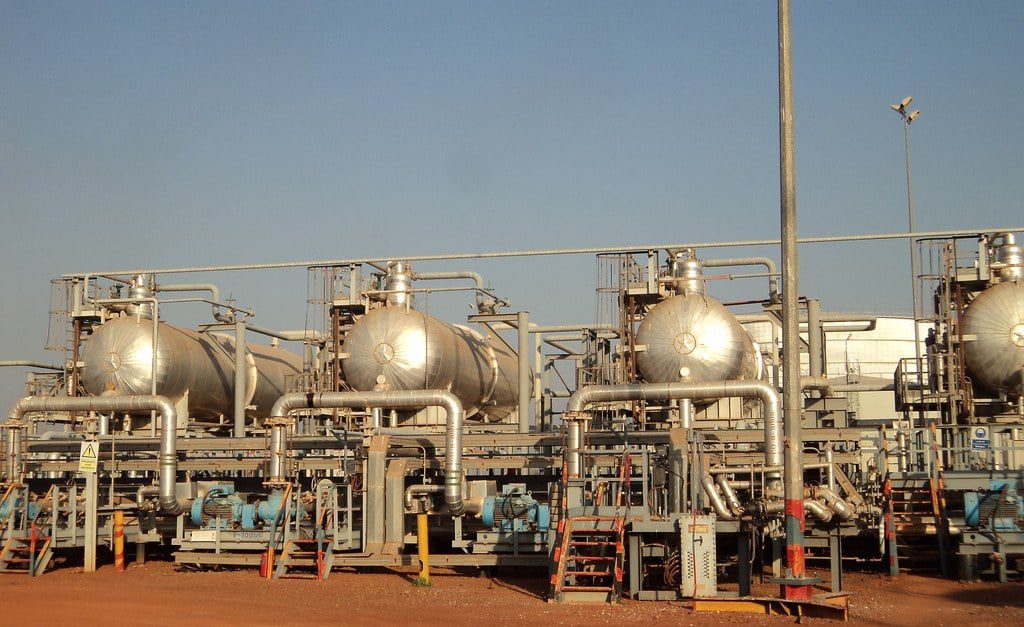It is expected that the export of fuel from the South Sudan (Benito) refinery of the “SNB” group to East African countries will begin in August 2023.
The head of the group, David Gala, said that the export of fuel to East African countries comes after overcoming many problems, according to the “Energy Capital and Power” website, in June 2023.
The problems of the South Sudan refinery varied between the exposure of its facilities to floods and the Corona pandemic (Covid-19), in addition to some technical malfunctions, and it seems that the conflict in Sudan will add a new burden.
It is noteworthy that the “SNB” group is the result of a partnership between the Nile Petroleum Company, Ltd., of South Sudan, and the Russian “Safinat”.
Gala said that the refinery’s production is of high quality; Almost 70% of the derivatives are free of sulfur, “and this is very rare.”
He added that the group seeks to build a local market for the oil derivatives produced in it, and includes – in addition to low-sulfur fuel – heavy fuel, which is used in electricity generation and industry. This enables South Sudan to reduce the cost of consuming electricity domestically.
Juba has the third largest oil reserves in sub-Saharan Africa, and the Ministry of Oil had announced the conclusion of deals with several companies in the middle of last year (2022), with the aim of financing and oil exploration, production and refining, in addition to infrastructure development work in the country, according to information I have seen. specialized power platform.
Benito refinery
The production of the Benito refinery, which is located in Unity State, increased from 3,000 barrels of oil per day – most of which were exported to its northern neighbor, Sudan – to 10,000 barrels of oil per day.
Because of the increase in production, Juba decided to expand exports to nearby East African countries.
The assistant to the head of the “SNP” group, which is affiliated with the South Sudanese refinery, David Gala, said that the operations are going well, and we supply fuel to Sudan, and “we look forward to exporting oil derivatives to other countries, and we have held discussions with several countries in East Africa, such as the Congo.”
Gala added that by next August, the products of the refinery in South Sudan will be ready for shipment to those countries.
The success of the Benito refinery in exporting oil derivatives to countries other than its neighbor Sudan represents an important step in a country that possesses large quantities of oil, but suffers from limited fuel production, and imports most of its needs from abroad.
Oil in South Sudan is the main crude oil in the East African region, but the country does not benefit much from it due to the high costs and obligations that go in favor of oil companies, according to what is known as production-sharing agreements.
South Sudan’s oil production, in mid-2022, amounted to about 170,000 barrels per day, most of its revenues go to oil companies in the form of advance payments or contractual obligations, while the country’s treasury only receives revenues equivalent to 5,000 barrels per day, according to data seen. It has a specialized power platform.
New crisis
Oil production and refineries in Juba may face a new crisis. What may be a reason for the refinery in South Sudan to seek to distribute exports to other countries, which is represented in the ongoing conflict in the country located on its northern borders, of which it was a part years ago, between the army and the Rapid Support Forces.
Sudan and South Sudan were one country years ago; However, the people of the south, most of whom embrace the Christian religion, asked for independence in the state of South Sudan. Where most of the population of the north embrace the Islamic religion.
The armed conflict has cast concerns over the future of oil flows from South Sudan, which does not enjoy sea outlets, through pipelines to Port Sudan on the Red Sea.
South Sudan relies on pipelines that cross Sudan to transport more than 1,500 square kilometers (932 miles) of crude from its fields to tankers in the Red Sea, before exporting it to global markets.
However, the Minister of Oil in the government of South Sudan, Fuat Kang Achol, confirmed – earlier – that oil production in his country is flowing as usual despite the violent conflict in Sudan, according to what was reported by “Sky News” last May.
In a related context, the Minister of Oil announced the start of exploration operations in block 2, during the “South Sudan Oil and Energy” conference in the capital (Juba), according to the “Energy Capital and Power” website, on Saturday, June 16, 2023.
This announcement came after a contract with the Strategic Fuel Fund “SFF” to purchase an aircraft used by the country in aerial surveys of the region.
“After 3 years of attempts, we finally succeeded in purchasing the plane, and we will start working on Block 2 now, and it will be historic,” said South Sudan’s Oil Minister Fuat Kang Achol.

Leave a Reply